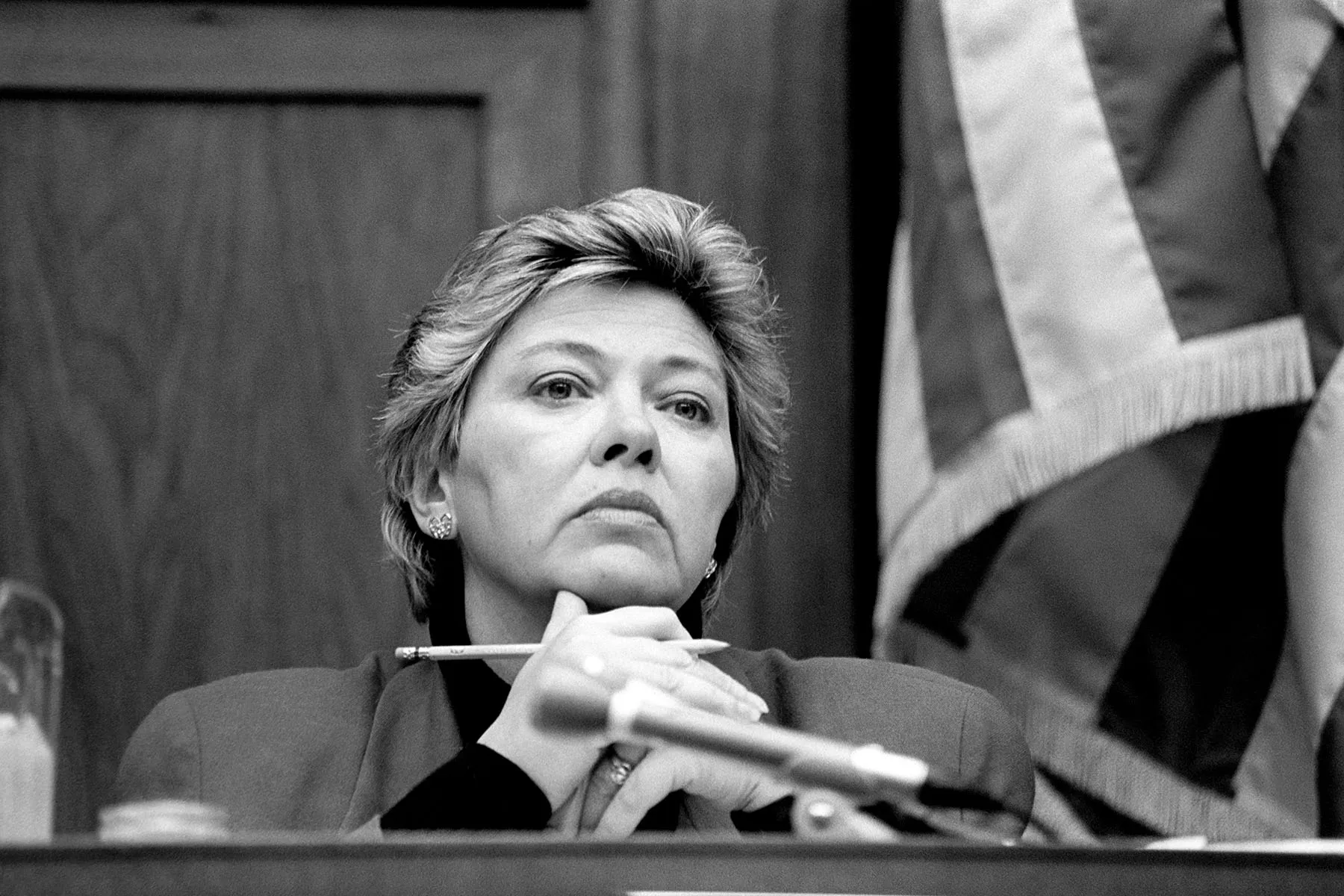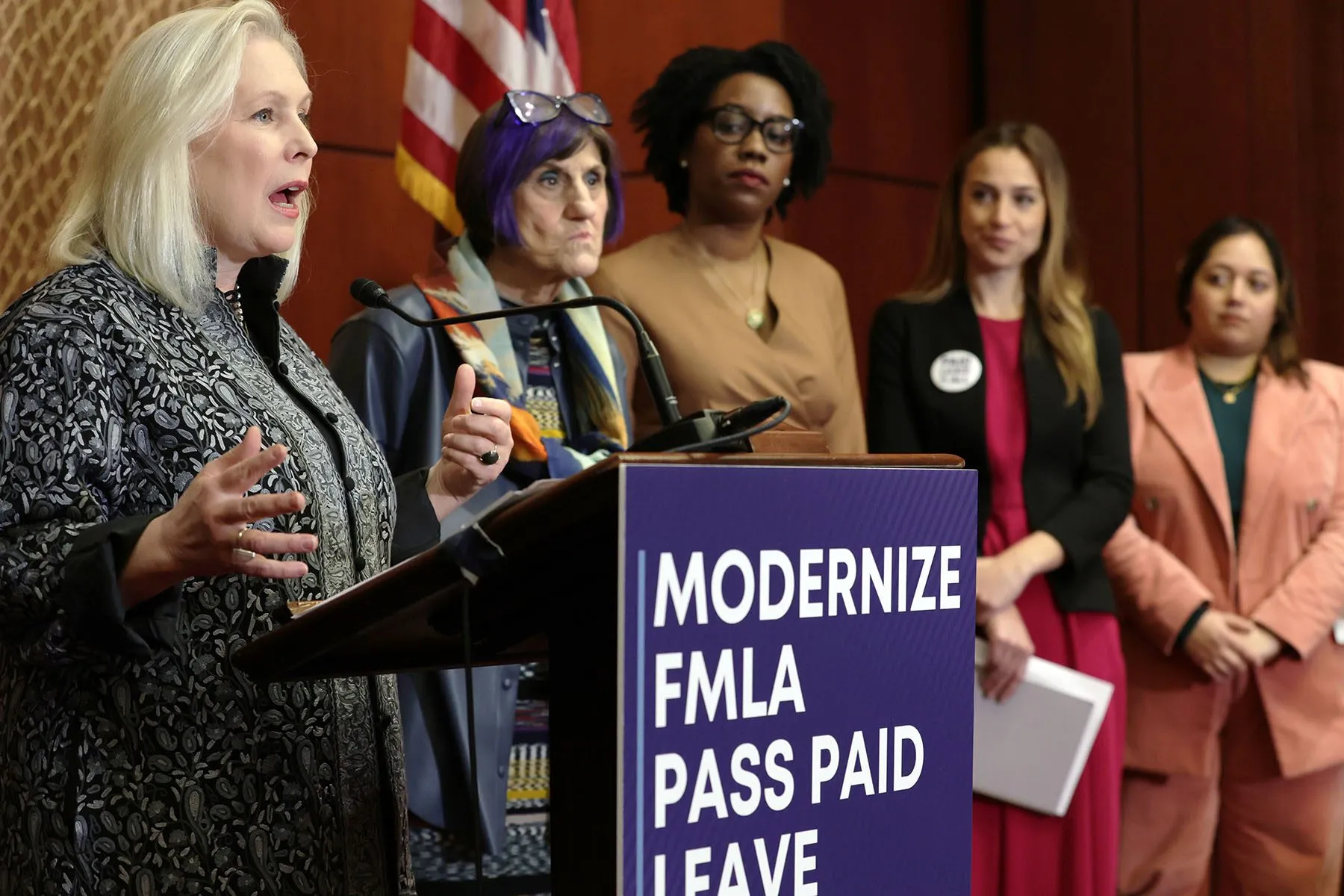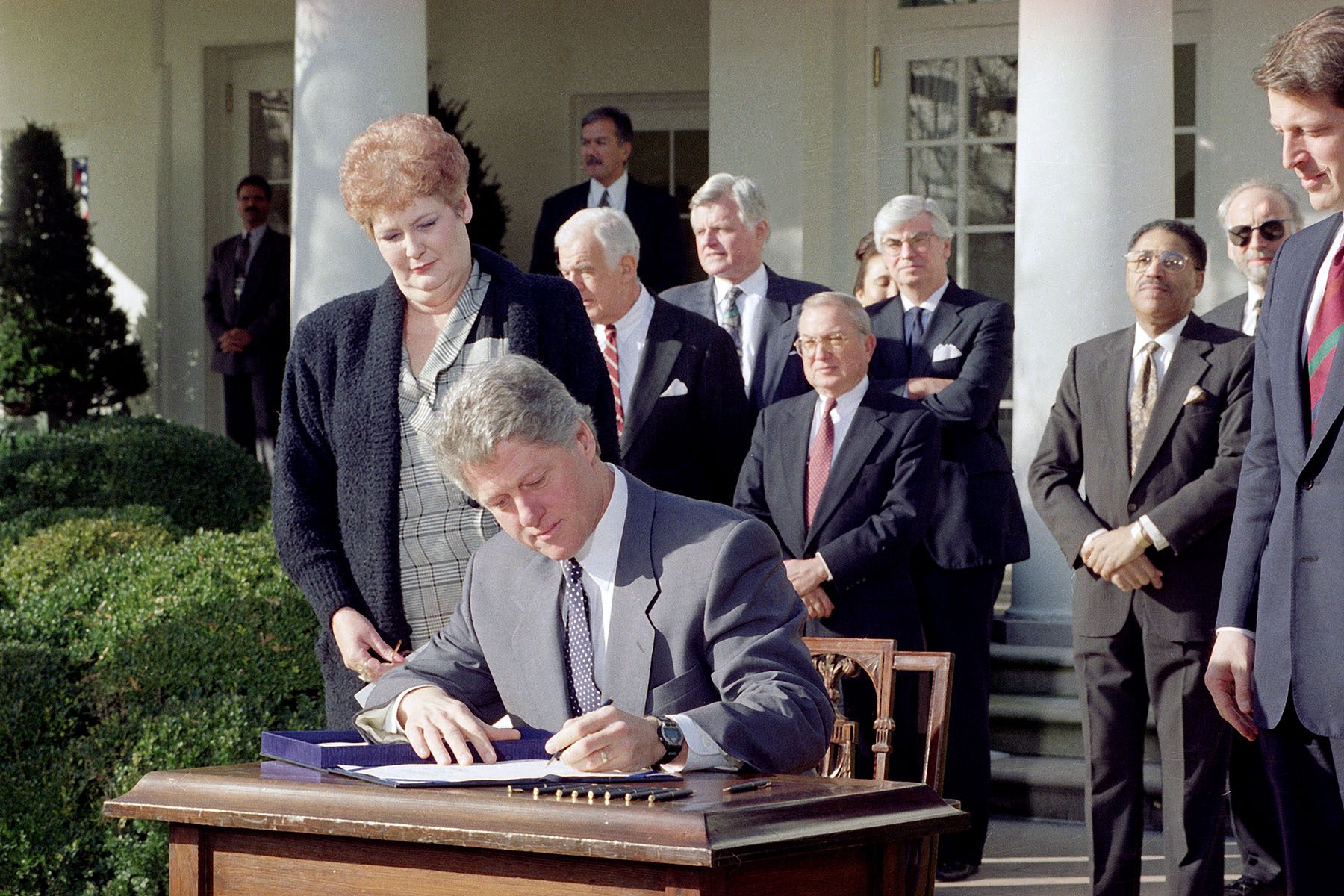*Correction appended.
Your trusted source for contextualizing the news. Sign up for our daily newsletter.
Sunday marked 30 years since Congress passed the United States’ first comprehensive federal family and sick leave program. The Family and Medical Leave Act (FMLA) was intended to pave the way for more expansive paid leave laws — but the law’s core promises, and the hopes of the advocates who fought for it, remain unfulfilled.
Advocates 30 years ago saw the passage of FMLA as the beginning, not the end, of what was possible at the federal level. But while hundreds of millions have benefited from the program, the United States remains the only wealthy nation without any national, guaranteed paid leave policy three decades on.
FMLA granted most American workers up to 12 weeks of unpaid leave to care for a new child, tend to their illness or injury, or care for a sick, injured or disabled immediate family member — with the guarantee of keeping their job. Over an estimated 460 million workers are estimated to have taken federally protected leave since the law’s passage.
Judith Lichtman, a pioneering women’s rights leader and lawyer, said Congress passing the Pregnancy Discrimination Act in 1978 was a catalyst for her and other advocates, launching a fight for even more federal workplace protections for caregiving starting in the early 1980s.
“It was thought of, at the time, by us as an important civil rights piece of legislation,” said Lichtman, the former president and now senior advisor at the National Partnership for Women and Families.
FMLA eventually emerged from that years-long fight, passing the U.S. Senate by a vote of 71-27 with 16 Republicans voting in favor of the legislation.
“It was viewed by others as a revolution,” Lichtman said. “And in some ways, it was revolutionary.”

Former Rep. Leslie Byrne, a Democrat from Virginia elected to Congress in the 1990s, said that the increased representation by women in Congress at the time helped ensure that family and medical leave remained a priority — even after President George H.W. Bush twice vetoed it.
“A number of people were aware that women, predominantly young women, were having to choose between taking care of a newborn or a parent that had become ill, and losing their job. Resolving that problem had been on the legislative agenda for over 20 years by the time I got there,” Byrne said.
The enactment of FMLA remains one of the highlights of her career in politics. At the time, she said, advocates celebrated the possibility of further expanding the country’s leave policies. Lichtman, too, said the debate over FMLA opened up a broader conversation about caregiving and prompted lawmakers, most of whom were men at the time, to share their personal experiences with caregiving.
“Everybody had a story,” Lichtman said. “This was a bill that addressed a need that tapped into something quite personal for people.”
FMLA is limited to those who have worked for an employer above a certain size for 12 months, leaving millions of predominantly low-income workers and women, including domestic and gig workers, to fall through the cracks.
Only 56 percent of American workers, and an even lower percentage of workers of color, are even eligible for unpaid leave under FMLA. An estimated 55 percent of workers identifying as Native American, Pacific Islander or multiracial, 48 percent of Latinx workers, 47 percent of Asian American workers and 43 percent of Black workers are not eligible for FMLA, according to the National Partnership. And fewer American workers have access to paid leave through their employers.
The modern shortcomings of FMLA were built into the structure of the law, a product of a legislative compromise that advocates at the time knew would be insufficient. That included even the length of unpaid leave that FMLA secured.
“[Twelve weeks] is an arbitrary number — a number that was arrived at through much negotiation,” Byrne said. “We all understood that this was incremental progress. We understood that it needed to be longer, and that it needed to be paid.”
Megan Sholar, a professor at Loyola University who has studied the history of FMLA and family leave policies for two decades, said that proposals for the number of weeks of guaranteed leave ranged from eight to 24 weeks. Lawmakers reached a compromise, Sholar and Lichtman said, because advocates considered job protection alone a significant victory.
“It was just a push and pull of what people would give, and in the end, activists did give away a lot thinking this was just going to be the starting point,” said Sholar, who later wrote a book on FMLA’s history.
“That’s not what activists hoped or expected. It’s been way worse. Because it’s been 30 years, and there’s hardly anything that’s changed,” she added.
An advocate told the New York Times in a February 1993 article that FMLA wouldn’t “make a big difference” for low-income families who largely couldn’t afford to take unpaid leave. That reality remains the same today: The National Partnership estimates that in 2022, over seven million workers who needed to take leave under FMLA didn’t because of lost wages.
“I think that’s one of the biggest lessons to take away from this particular fight: that in that instance, settling was not a good idea, in retrospect,” Sholar said. “Looking at it now, you’re just thinking, all that did was give politicians all around a way to say it was a win.”
Some paid leave benefits were extended to federal contractors and employees under the Obama and Trump administrations. President Joe Biden’s proposed Build Back Better agenda, an ambitious economic proposal, included four weeks of guaranteed paid family and sick leave but failed due to opposition from Republicans and Democratic Sen. Joe Manchin.
Support for longer, and especially paid, leave has grown in the light of the COVID-19 pandemic, which highlighted the caregiving crisis in the United States. Much of that growing advocacy is being driven by a new generation of mothers for whom access to unpaid parental leave was the standard, and the lack of paid parental leave somewhere between surprising and appalling. While the efforts to pass federal paid leave in Biden’s economic agenda may have failed, they inspired Gen X and millennial moms to carry on the legacy of those who paved the way with FMLA.
Raena Boston, co-founder of maternal wellbeing nonprofit Chamber of Mothers, said during the Build Back Better debate, “for the first time I felt like wow, we’re gonna get it right as a country. We’re gonna have 12 weeks of paid leave. I’m proud to be an American.”
Then it all fell apart. “I knew what it had been to be broke, and to be stringing my leaves together with bubblegum and tape,” she said.
Party-line paid leave proposals are unlikely to pass through a divided Congress. That includes the Democrat-backed FAMILY Act by Rep. Rosa DeLauro of Connecticut and Sen. Kirsten Gillibrand of New York that was reintroduced Wednesday. Still, advocates see hope in nascent bipartisan efforts. A group of House lawmakers from both parties formed a task force at the beginning of 2023 dedicated to finding a bipartisan solution to the lack of paid leave at the federal level.

At a January reception in Washington, D.C., convened by the Bipartisan Policy Center, a think tank, and Engage, an organization focused on women’s economic security, Rep. Chrissy Houlahan of Pennsylvania, a Democrat and co-chair of the task force, reflected on how the paid leave movement has been ongoing since the birth of her children, who are now 28 and 30. She pledged that “this time is different.”
While movement at the federal level has stalled, over a dozen primarily Democratic-controlled states picked up where Congress left off and have passed guaranteed paid family leave programs in the years since FMLA. And Democrats’ gains at the state level in the 2022 midterms set the stage for even more states to pass paid family and sick leave policies.
“We certainly support state progress because the more states that come on, the more of the workforce that gets covered, “Eventually, I think there’ll be even more pressure to pass a federal bill,” said Jocelyn Frye, president of the National Partnership. “I’m pretty sure that from an employer standpoint, I have yet to meet an employer who wants 50 different policies.”
Curran McSwigan, an economic policy advisor at the centrist think tank Third Way, noted that the states have also experimented with different eligibility and funding structures that can serve as a blueprint for federal policymakers. Some of the first states to pass paid leave programs, like California, have continued to update and expand their leave programs by increasing wage replacement rates and broadening eligibility for leave to extended and chosen family.
“I think that was a great example of continued progress in the space of paid leave, even after passing a larger program,” McSwigan said.
The overturning of Roe v. Wade, which subjected millions more people to the prospect of parenthood without paid leave, and the ongoing caregiving crisis in the United States makes 2023 a particularly crucial inflection point for the paid leave movement.
“We have a lot of folks wanting to go back,” Frye said. “I think it’s important to celebrate the history, but we can never take that history for granted.”
Lichtman said her advice for the next generation of advocates is to remember that change can be incremental and “persistence matters” — as does “understanding that you’re in civil rights fights for the long haul, and that’s not always so glorious.”
“When you’re in the midst of it, in the middle of that nine year battle, I can’t say we were having a lot of fun,” she said. “At the same time, you can celebrate the fact that family and medical leave has been used 460 million times. I can’t say that enough, because every time I say it, I just break into this gigantic smile.”
Correction: An earlier version of this article misspelled Judith Lichtman's name in some instances.





